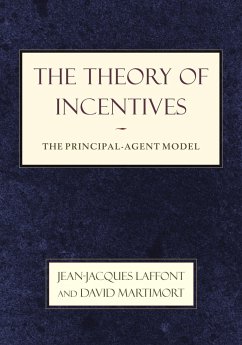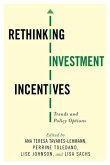- Broschiertes Buch
- Merkliste
- Auf die Merkliste
- Bewerten Bewerten
- Teilen
- Produkt teilen
- Produkterinnerung
- Produkterinnerung
Following a brief historical overview showing how the problem of incentives has come to the fore in the past two centuries, the authors their work to exploring principal-agent models and various extensions thereof in light of three types of information problems: adverse selection, moral hazard, and non-verifiability.
Andere Kunden interessierten sich auch für
![Think Like a Freak Think Like a Freak]() Steven D. LevittThink Like a Freak11,99 €
Steven D. LevittThink Like a Freak11,99 €![Think Like a Freak Think Like a Freak]() Steven D. LevittThink Like a Freak25,99 €
Steven D. LevittThink Like a Freak25,99 €![The Hidden Costs of Reward The Hidden Costs of Reward]() The Hidden Costs of Reward69,99 €
The Hidden Costs of Reward69,99 €![Financial Whirlpools Financial Whirlpools]() Karen L. HigginsFinancial Whirlpools48,99 €
Karen L. HigginsFinancial Whirlpools48,99 €![European Integration and Transformation in the Western Balkans European Integration and Transformation in the Western Balkans]() European Integration and Transformation in the Western Balkans78,99 €
European Integration and Transformation in the Western Balkans78,99 €![Human Resource Management and Internal Marketing Human Resource Management and Internal Marketing]() Teena MishraHuman Resource Management and Internal Marketing35,99 €
Teena MishraHuman Resource Management and Internal Marketing35,99 €![Rethinking Investment Incentives Rethinking Investment Incentives]() Rethinking Investment Incentives71,99 €
Rethinking Investment Incentives71,99 €-
-
-
Following a brief historical overview showing how the problem of incentives has come to the fore in the past two centuries, the authors their work to exploring principal-agent models and various extensions thereof in light of three types of information problems: adverse selection, moral hazard, and non-verifiability.
Hinweis: Dieser Artikel kann nur an eine deutsche Lieferadresse ausgeliefert werden.
Hinweis: Dieser Artikel kann nur an eine deutsche Lieferadresse ausgeliefert werden.
Produktdetails
- Produktdetails
- Verlag: Princeton University Press
- Seitenzahl: 440
- Erscheinungstermin: 15. Januar 2002
- Englisch
- Abmessung: 254mm x 179mm x 32mm
- Gewicht: 908g
- ISBN-13: 9780691091846
- ISBN-10: 0691091846
- Artikelnr.: 21613926
- Herstellerkennzeichnung Die Herstellerinformationen sind derzeit nicht verfügbar.
- Verlag: Princeton University Press
- Seitenzahl: 440
- Erscheinungstermin: 15. Januar 2002
- Englisch
- Abmessung: 254mm x 179mm x 32mm
- Gewicht: 908g
- ISBN-13: 9780691091846
- ISBN-10: 0691091846
- Artikelnr.: 21613926
- Herstellerkennzeichnung Die Herstellerinformationen sind derzeit nicht verfügbar.
Jean-Jacques Laffont & David Martimort
xi Foreword
Introduction 1
1 Incentives in Economic Thought 7
1.1 Adam Smith and Incentive Contracts in Agriculture 8
1.2 Chester Barnard and Incentives in Management 11
1.3 Hume, Wicksell, Groves: The Free-Rider Problem 14
1.4 Borda, Bowen, Vickrey: Incentives in Voting 15
1.5 Leon Walras and the Regulation of Natural Monopolies 18
1.6 Knight, Arrow, Pauly: Incentives in Insurance 18
1.7 Sidgwick, Vickrey, Mirrlees: Redistribution and Incentives 20
1.8 Dupuit, Edgeworth, Pigou: Price Discrimination 22
1.9 Incentives in Planned Economies 23
1.10 Leonid Hurwicz and Mechanism Design 25
1.11 Auctions 27
2 The Rent Extraction-Efficiency Trade-Off 28
2.1 The Basic Model 32
2.2 The Complete Information Optimal Contract 33
2.3 Incentive Feasible Menu of Contracts 36
2.4 Information Rents 39
2.5 The Optimization Program of the Principal 40
2.6 The Rent Extraction-Efficiency Trade-Off 41
2.7 The Theory of the Firm Under Asymmetric Information 46
2.8 Asymmetric Information and Marginal Cost Pricing 48
2.9 The Revelation Principle 48
2.10 A More General Utility Function for the Agent 51
2.11 Ex Ante versus Ex Post Participation Constraints 57
2.12 Commitment 63
2.13 Stochastic Mechanisms 65
2.14 Informative Signals to Improve Contracting 68
2.15 Contract Theory at Work 72
Appendix 81
3 Incentive and Participation Constraints with Adverse Selection 82
3.1 More than Two Types 86
3.2 Multidimensional Asymmetric Information 93
3.3 Type-Dependent Participation Constraint and Countervailing Incentives
101
3.4 Random Participation Constraint 115
3.5 Limited Liability 118
3.6 Audit Mechanisms and Costly State Verification 121
3.7 Redistributive Concerns and the Efficiency-Equity Trade-Off
134 Appendices 130
4 Moral Hazard: The Basic Trade-Offs 145
4.1 The Model 148
4.2 Risk Neutrality and First-Best Implementation 153
4.3 The Trade-Off Between Limited Liability Rent Extraction and Efficiency
155
4.4 The Trade-Off Between Insurance and Efficiency 158
4.5 More than Two Levels of Performance 163
4.6 Informative Signals to Improve Contracting 167
4.7 Moral Hazard and the Theory of the Firm 172
4.8 Contract Theory at Work 174
4.9 Commitment Under Moral Hazard 184
Appendices 185
5 Incentive and Participation Constraints with Moral Hazard 187
5.1 More than Two Levels of Effort 191
5.2 The Multitask Incentive Problem 203
5.3 Nonseparability of the Utility Function 226
5.4 Redistribution and Moral Hazard 232
Appendices 235
6 Nonverifiability 260
6.1 No Contract at Date 0 and Ex Post Bargaining 242
6.2 Incentive Compatible Contract 244
6.3 Nash Implementation 246
6.4 Subgame-Perfect Implementation 256
6.5 Risk Aversion 261
6.6 Concluding Remarks 264
7 Mixed Models 265
7.1 Adverse Selection Followed by Moral Hazard 269
7.2 Moral Hazard Followed by Adverse Selection 294
7.3 Moral Hazard Followed by Nonverifiability 298
8 Dynamics Under Full Commitment 303
8.1 Repeated Adverse Selection 307
8.2 Repeated Moral Hazard 319
8.3 Constraints on Transfers: The Role of Implicit Incentives 342
9 Limits and Extensions 347
9.1 Informed Principal 351
9.2 Limits to Enforcement 360
9.3 Dynamics and Limited Commitment 364
9.4 The Hold-Up Problem 370
9.5 Limits to the Complexity of Contracts 375
9.6 Limits in the Action Space 387
9.7 Limits to Rational Behavior 391
9.8 Endogenous Information Structures 395
References 399
Author Index 413
Subject Index 417
Introduction 1
1 Incentives in Economic Thought 7
1.1 Adam Smith and Incentive Contracts in Agriculture 8
1.2 Chester Barnard and Incentives in Management 11
1.3 Hume, Wicksell, Groves: The Free-Rider Problem 14
1.4 Borda, Bowen, Vickrey: Incentives in Voting 15
1.5 Leon Walras and the Regulation of Natural Monopolies 18
1.6 Knight, Arrow, Pauly: Incentives in Insurance 18
1.7 Sidgwick, Vickrey, Mirrlees: Redistribution and Incentives 20
1.8 Dupuit, Edgeworth, Pigou: Price Discrimination 22
1.9 Incentives in Planned Economies 23
1.10 Leonid Hurwicz and Mechanism Design 25
1.11 Auctions 27
2 The Rent Extraction-Efficiency Trade-Off 28
2.1 The Basic Model 32
2.2 The Complete Information Optimal Contract 33
2.3 Incentive Feasible Menu of Contracts 36
2.4 Information Rents 39
2.5 The Optimization Program of the Principal 40
2.6 The Rent Extraction-Efficiency Trade-Off 41
2.7 The Theory of the Firm Under Asymmetric Information 46
2.8 Asymmetric Information and Marginal Cost Pricing 48
2.9 The Revelation Principle 48
2.10 A More General Utility Function for the Agent 51
2.11 Ex Ante versus Ex Post Participation Constraints 57
2.12 Commitment 63
2.13 Stochastic Mechanisms 65
2.14 Informative Signals to Improve Contracting 68
2.15 Contract Theory at Work 72
Appendix 81
3 Incentive and Participation Constraints with Adverse Selection 82
3.1 More than Two Types 86
3.2 Multidimensional Asymmetric Information 93
3.3 Type-Dependent Participation Constraint and Countervailing Incentives
101
3.4 Random Participation Constraint 115
3.5 Limited Liability 118
3.6 Audit Mechanisms and Costly State Verification 121
3.7 Redistributive Concerns and the Efficiency-Equity Trade-Off
134 Appendices 130
4 Moral Hazard: The Basic Trade-Offs 145
4.1 The Model 148
4.2 Risk Neutrality and First-Best Implementation 153
4.3 The Trade-Off Between Limited Liability Rent Extraction and Efficiency
155
4.4 The Trade-Off Between Insurance and Efficiency 158
4.5 More than Two Levels of Performance 163
4.6 Informative Signals to Improve Contracting 167
4.7 Moral Hazard and the Theory of the Firm 172
4.8 Contract Theory at Work 174
4.9 Commitment Under Moral Hazard 184
Appendices 185
5 Incentive and Participation Constraints with Moral Hazard 187
5.1 More than Two Levels of Effort 191
5.2 The Multitask Incentive Problem 203
5.3 Nonseparability of the Utility Function 226
5.4 Redistribution and Moral Hazard 232
Appendices 235
6 Nonverifiability 260
6.1 No Contract at Date 0 and Ex Post Bargaining 242
6.2 Incentive Compatible Contract 244
6.3 Nash Implementation 246
6.4 Subgame-Perfect Implementation 256
6.5 Risk Aversion 261
6.6 Concluding Remarks 264
7 Mixed Models 265
7.1 Adverse Selection Followed by Moral Hazard 269
7.2 Moral Hazard Followed by Adverse Selection 294
7.3 Moral Hazard Followed by Nonverifiability 298
8 Dynamics Under Full Commitment 303
8.1 Repeated Adverse Selection 307
8.2 Repeated Moral Hazard 319
8.3 Constraints on Transfers: The Role of Implicit Incentives 342
9 Limits and Extensions 347
9.1 Informed Principal 351
9.2 Limits to Enforcement 360
9.3 Dynamics and Limited Commitment 364
9.4 The Hold-Up Problem 370
9.5 Limits to the Complexity of Contracts 375
9.6 Limits in the Action Space 387
9.7 Limits to Rational Behavior 391
9.8 Endogenous Information Structures 395
References 399
Author Index 413
Subject Index 417
xi Foreword
Introduction 1
1 Incentives in Economic Thought 7
1.1 Adam Smith and Incentive Contracts in Agriculture 8
1.2 Chester Barnard and Incentives in Management 11
1.3 Hume, Wicksell, Groves: The Free-Rider Problem 14
1.4 Borda, Bowen, Vickrey: Incentives in Voting 15
1.5 Leon Walras and the Regulation of Natural Monopolies 18
1.6 Knight, Arrow, Pauly: Incentives in Insurance 18
1.7 Sidgwick, Vickrey, Mirrlees: Redistribution and Incentives 20
1.8 Dupuit, Edgeworth, Pigou: Price Discrimination 22
1.9 Incentives in Planned Economies 23
1.10 Leonid Hurwicz and Mechanism Design 25
1.11 Auctions 27
2 The Rent Extraction-Efficiency Trade-Off 28
2.1 The Basic Model 32
2.2 The Complete Information Optimal Contract 33
2.3 Incentive Feasible Menu of Contracts 36
2.4 Information Rents 39
2.5 The Optimization Program of the Principal 40
2.6 The Rent Extraction-Efficiency Trade-Off 41
2.7 The Theory of the Firm Under Asymmetric Information 46
2.8 Asymmetric Information and Marginal Cost Pricing 48
2.9 The Revelation Principle 48
2.10 A More General Utility Function for the Agent 51
2.11 Ex Ante versus Ex Post Participation Constraints 57
2.12 Commitment 63
2.13 Stochastic Mechanisms 65
2.14 Informative Signals to Improve Contracting 68
2.15 Contract Theory at Work 72
Appendix 81
3 Incentive and Participation Constraints with Adverse Selection 82
3.1 More than Two Types 86
3.2 Multidimensional Asymmetric Information 93
3.3 Type-Dependent Participation Constraint and Countervailing Incentives
101
3.4 Random Participation Constraint 115
3.5 Limited Liability 118
3.6 Audit Mechanisms and Costly State Verification 121
3.7 Redistributive Concerns and the Efficiency-Equity Trade-Off
134 Appendices 130
4 Moral Hazard: The Basic Trade-Offs 145
4.1 The Model 148
4.2 Risk Neutrality and First-Best Implementation 153
4.3 The Trade-Off Between Limited Liability Rent Extraction and Efficiency
155
4.4 The Trade-Off Between Insurance and Efficiency 158
4.5 More than Two Levels of Performance 163
4.6 Informative Signals to Improve Contracting 167
4.7 Moral Hazard and the Theory of the Firm 172
4.8 Contract Theory at Work 174
4.9 Commitment Under Moral Hazard 184
Appendices 185
5 Incentive and Participation Constraints with Moral Hazard 187
5.1 More than Two Levels of Effort 191
5.2 The Multitask Incentive Problem 203
5.3 Nonseparability of the Utility Function 226
5.4 Redistribution and Moral Hazard 232
Appendices 235
6 Nonverifiability 260
6.1 No Contract at Date 0 and Ex Post Bargaining 242
6.2 Incentive Compatible Contract 244
6.3 Nash Implementation 246
6.4 Subgame-Perfect Implementation 256
6.5 Risk Aversion 261
6.6 Concluding Remarks 264
7 Mixed Models 265
7.1 Adverse Selection Followed by Moral Hazard 269
7.2 Moral Hazard Followed by Adverse Selection 294
7.3 Moral Hazard Followed by Nonverifiability 298
8 Dynamics Under Full Commitment 303
8.1 Repeated Adverse Selection 307
8.2 Repeated Moral Hazard 319
8.3 Constraints on Transfers: The Role of Implicit Incentives 342
9 Limits and Extensions 347
9.1 Informed Principal 351
9.2 Limits to Enforcement 360
9.3 Dynamics and Limited Commitment 364
9.4 The Hold-Up Problem 370
9.5 Limits to the Complexity of Contracts 375
9.6 Limits in the Action Space 387
9.7 Limits to Rational Behavior 391
9.8 Endogenous Information Structures 395
References 399
Author Index 413
Subject Index 417
Introduction 1
1 Incentives in Economic Thought 7
1.1 Adam Smith and Incentive Contracts in Agriculture 8
1.2 Chester Barnard and Incentives in Management 11
1.3 Hume, Wicksell, Groves: The Free-Rider Problem 14
1.4 Borda, Bowen, Vickrey: Incentives in Voting 15
1.5 Leon Walras and the Regulation of Natural Monopolies 18
1.6 Knight, Arrow, Pauly: Incentives in Insurance 18
1.7 Sidgwick, Vickrey, Mirrlees: Redistribution and Incentives 20
1.8 Dupuit, Edgeworth, Pigou: Price Discrimination 22
1.9 Incentives in Planned Economies 23
1.10 Leonid Hurwicz and Mechanism Design 25
1.11 Auctions 27
2 The Rent Extraction-Efficiency Trade-Off 28
2.1 The Basic Model 32
2.2 The Complete Information Optimal Contract 33
2.3 Incentive Feasible Menu of Contracts 36
2.4 Information Rents 39
2.5 The Optimization Program of the Principal 40
2.6 The Rent Extraction-Efficiency Trade-Off 41
2.7 The Theory of the Firm Under Asymmetric Information 46
2.8 Asymmetric Information and Marginal Cost Pricing 48
2.9 The Revelation Principle 48
2.10 A More General Utility Function for the Agent 51
2.11 Ex Ante versus Ex Post Participation Constraints 57
2.12 Commitment 63
2.13 Stochastic Mechanisms 65
2.14 Informative Signals to Improve Contracting 68
2.15 Contract Theory at Work 72
Appendix 81
3 Incentive and Participation Constraints with Adverse Selection 82
3.1 More than Two Types 86
3.2 Multidimensional Asymmetric Information 93
3.3 Type-Dependent Participation Constraint and Countervailing Incentives
101
3.4 Random Participation Constraint 115
3.5 Limited Liability 118
3.6 Audit Mechanisms and Costly State Verification 121
3.7 Redistributive Concerns and the Efficiency-Equity Trade-Off
134 Appendices 130
4 Moral Hazard: The Basic Trade-Offs 145
4.1 The Model 148
4.2 Risk Neutrality and First-Best Implementation 153
4.3 The Trade-Off Between Limited Liability Rent Extraction and Efficiency
155
4.4 The Trade-Off Between Insurance and Efficiency 158
4.5 More than Two Levels of Performance 163
4.6 Informative Signals to Improve Contracting 167
4.7 Moral Hazard and the Theory of the Firm 172
4.8 Contract Theory at Work 174
4.9 Commitment Under Moral Hazard 184
Appendices 185
5 Incentive and Participation Constraints with Moral Hazard 187
5.1 More than Two Levels of Effort 191
5.2 The Multitask Incentive Problem 203
5.3 Nonseparability of the Utility Function 226
5.4 Redistribution and Moral Hazard 232
Appendices 235
6 Nonverifiability 260
6.1 No Contract at Date 0 and Ex Post Bargaining 242
6.2 Incentive Compatible Contract 244
6.3 Nash Implementation 246
6.4 Subgame-Perfect Implementation 256
6.5 Risk Aversion 261
6.6 Concluding Remarks 264
7 Mixed Models 265
7.1 Adverse Selection Followed by Moral Hazard 269
7.2 Moral Hazard Followed by Adverse Selection 294
7.3 Moral Hazard Followed by Nonverifiability 298
8 Dynamics Under Full Commitment 303
8.1 Repeated Adverse Selection 307
8.2 Repeated Moral Hazard 319
8.3 Constraints on Transfers: The Role of Implicit Incentives 342
9 Limits and Extensions 347
9.1 Informed Principal 351
9.2 Limits to Enforcement 360
9.3 Dynamics and Limited Commitment 364
9.4 The Hold-Up Problem 370
9.5 Limits to the Complexity of Contracts 375
9.6 Limits in the Action Space 387
9.7 Limits to Rational Behavior 391
9.8 Endogenous Information Structures 395
References 399
Author Index 413
Subject Index 417








